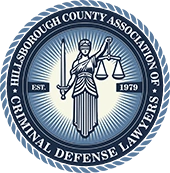Hillsborough County Criminal Lawyer
Hillsborough County Criminal Attorney

Facing criminal charges in Hillsborough County can be a daunting experience, but you don’t have to navigate it alone. A Hillsborough County lawyer can offer the knowledge, commitment, and legal know-how required to safeguard your rights and achieve an optimal outcome.
Whether you are facing misdemeanors, felonies, DUI charges, drug offenses, or any other criminal allegations, it is imperative that you have an informed and competent Hillsborough County criminal lawyer at your side. They can help you at every stage of the procedure, from the initial arrest to court appearances and beyond, as they are familiar with the nuances of the local criminal justice system.
A good attorney will help you not only with the legal issues you’re facing but also deal with the emotional concerns that naturally arise with criminal charges. Paul Figueroa is an experienced attorney who will fight tirelessly to protect you from the very moment you are charged until your case is resolved. We strive to minimize the collateral consequences of criminal charges on your life going forward.
Paul Figueroa Law is based in Tampa, Florida, and is a law firm that is knowledgeable about the federal, state, and local laws that affect our client’s criminal cases. He will work tirelessly to investigate your case, refute any evidence used against you, and evaluate your case to develop potent defense plan that is specific to your circumstances.
Criminal defense lawyer, Paul Figueroa, will work to lessen the possible repercussions of a conviction and to guarantee that you are given a fair trial. He has significant trial experience in criminal defense, which allows him to fight for your rights, negotiate with prosecutors, and give you the support you need at this trying time by drawing on his extensive knowledge and courtroom experience.
Whether you are facing serious charges or seeking to expunge your record, our commitment to your defense can make a significant difference in the outcome of your case.
About Paul Figueroa Law
At Paul Figueroa Law, we recognize that if you are reaching out to a criminal defense attorney, it is likely one of the most challenging times in your life. When you reach out to us for support, we aim to be trusted advocates as you challenge the charges you face. With over fifteen years of experience in practicing law, we have stood beside countless families and individuals who needed someone to fight for them and protect their rights.
Throughout our career, we have represented thousands of clients facing various challenges, including criminal charges, personal injuries caused by others’ negligence, and involuntary examinations or admissions due to mental health issues or addiction. Each client who seeks our help does so because they need an attorney with experience and dedication in these areas.
We understand that navigating the legal system can be confusing, overwhelming, and often frightening. Our commitment is to provide the guidance and support necessary to help our clients through these difficult times.
When you hire Paul Figueroa Law, you are choosing a firm that will stand with you and fight for your rights. We work tirelessly on every case, ensuring that our clients receive fair, reliable, and qualified support.
Our approach is tailored to meet each individual’s unique needs, focusing on building trust and delivering results. We are here to navigate the complexities of the legal system on your behalf, providing the protection and advocacy you need to move forward with confidence.
Role and Importance of a Criminal Lawyer
Having a committed and experienced criminal defense attorney can have a major impact on how your case ends. It is crucial to retain legal counsel as soon as you are charged or even under investigation for criminal allegations in order to maintain your rights and navigate the judicial system. Our job is to help you every step of the way by offering advice, encouragement, and a strong defense. We provide essential services, including:
- Case Evaluation: Analyzing your case’s specific facts and in order to evaluate the potential risks or exposure your face in creating your individualized defense plan.
- Defense Strategy: Developing a thorough plan to refute the facts and make the strongest possible case for yourself.
- Court Representation: Standing up for you in all court proceedings and making sure your defense is properly presented to the prosecution, the court, and potentially a jury.
Beyond these core services, we also offer comprehensive support in negotiating plea bargains, guiding clients through pretrial diversion programs, and assisting with probation and parole matters. Our holistic approach ensures that you receive quality defense and support throughout your legal journey.
Types of Criminal Charges in Hillsborough County
Hillsborough County, criminal courts throughout the Tampa Bay Area and the state of Florida see a wide range of criminal charges, each with unique implications and defense strategies. Understanding the nature of your charges is the first step in building a strong defense. Our team is experienced in handling these types of cases and more, ensuring comprehensive representation for our clients.
- Misdemeanors: These are less severe offenses, but they can still result in significant penalties, including fines and jail time.
- Felonies: More serious crimes that can result in long-term imprisonment and substantial fines.
- DUI and Traffic Offenses: Driving under the influence and other traffic violations can lead to severe penalties, including incarceration and license suspension.
- Drug Offenses: Charges range from possession to trafficking, each carrying different consequences.
- Violent Crimes: Assault, battery, and other violent crimes often involve severe penalties and require a strong defense.
- White-Collar Crimes: Fraud, embezzlement, and other financial crimes require certain knowledge and defense strategies.
- Theft and Property Crimes: These include burglary, larceny, and other property-related offenses.
- Domestic Violence: Charges can result from disputes within households or families and carry both criminal and personal consequences.
- Collateral consequences: Many if not all criminal charges can cause collateral consequences such as professional licensing, freedom to live where you choose, or your ability to exercise certain constitutional rights such as your right to possess a firearm.
In addition to these common charges, we also handle cases involving cybercrimes, public corruption, and environmental violations. Each type of charge presents unique challenges, and we are equipped with the knowledge to address them effectively.
Steps in the Criminal Defense Process
Understanding the criminal defense process can help alleviate some of the anxiety associated with facing criminal charges. Each step is critical, and we are committed to guiding you through the process with professionalism and dedication. The following is an overview of what to expect:
- Initial Consultation and Case Assessment: We begin by thoroughly reviewing your case details and discussing your concerns and objectives.
- Investigation and Evidence Gathering: Collecting and examining all relevant evidence, including witness statements, police reports, and physical evidence.
- Pre-Trial Motions and Hearings: Filing necessary motions to challenge the prosecution’s evidence and potentially dismiss charges.
- Trial Preparation: Developing a trial strategy, preparing witnesses, and planning the presentation of evidence.
- The Trial: Representing you in court, cross-examining witnesses, and presenting your defense.
- Sentencing: If convicted, advocating for the most lenient possible sentence based on the circumstances of your case.
Understanding Your Rights During Arrest
During an arrest, it’s important to know your rights. You have both the right to defense counsel and the right to silence. Calmly assert your rights instead of resisting arrest. It’s imperative to wait to speak with legal counsel before saying anything, as everything you say could be used against you in court.
In addition, you are entitled to a fair trial and to be aware of the charges that are being made against you. Knowing these rights can be beneficial in safeguarding your legal interests during and after an arrest.
Plea Bargaining and Negotiations
Plea bargains are agreements between the defendant and the prosecutor in which the defendant pleads guilty to a lesser charge or accepts a reduced sentence in exchange for avoiding trial. This technique can be advantageous because it reduces uncertainty and results in more lenient sanctions.
Accepting a plea bargain, however, requires careful analysis of the evidence and prospective outcomes. We negotiate on behalf of our clients to obtain fair conditions, ensuring that they are fully aware of the consequences of accepting a plea bargain. Our goal is to minimize the impact on our client’s lives while swiftly resolving their legal difficulties.
Defenses Against Criminal Charges
Understanding and applying a variety of legal methods is necessary to build a compelling defense. Our method is to thoroughly examine each element of your case in order to determine the most effective defense plan. These are some typical defenses that we might use in your situation:
- Self-Defense: Making the case that what you did was required to keep other people or yourself safe.
- Absence of Intent: Proving that you did not intend to commit the crime, which is an important aspect in some cases.
- Insufficient Evidence: Arguing that there is insufficient evidence to establish the accused’s guilt beyond a reasonable doubt.
- Constitutional Violations: Noting any infringements on your rights that may have occurred, such as illegal searches and seizures.
- Alibi: Offering proof that you were somewhere else when the crime was committed is known as an alibi defense.
Other defenses may include entrapment, duress, and mistaken identity. Each defense strategy is tailored to the specific circumstances of your case, ensuring that all possible angles are explored to achieve a favorable outcome.
Common Mistakes to Avoid When Facing Criminal Charges:
When facing criminal accusations, it is critical to avoid errors that can undermine your case. This can happen due to stress, nervousness, misunderstanding the severity of the accusations, or even avoiding facing the allegations.
First and foremost, never communicate with the police without an attorney present. When an individual is being accused of a crime there is often an urge to attempt to defend yourself to law enforcement, explain the circumstances of the event(s), or minimize or even exaggerate their involvement in the events. Anything you say may be used against you in court, this can impact your decision to testify at a later time and can limit or even exclude some legitimate defenses that you had to the criminal accusations.
Second, do not neglect court dates or legal documentation, as failing to appear in court may result in an arrest warrant. Finally, do not discuss your case with anybody other than your lawyer, as even casual discussions might be utilized as evidence.
Because there are numerous actions that can ultimately hinder your case, speaking with an experienced criminal defense attorney is an effective way to avoid other mistakes.
Understanding the Consequences of Criminal Convictions
Being convicted of a crime can have far-reaching effects in addition to the immediate penalties. To fully understand the value of a strong defense, one must be aware of these effects. The following are some possible repercussions of a criminal conviction:
- Incarceration and Other Criminal Penalties: Depending on the charge, a conviction can result in you spending time in state jail or prison. Other potential penalties include fines, community service, or participation in court-mandated courses. Losing both your freedom and financial stability are certainly possible if you are convicted of a crime.
- Impacts on Employment and Future Opportunities: Possession of a criminal record may impede one’s ability to obtain professional licenses, advance in their field, and find employment, especially if there is a break in your employment record while serving a jail sentence.
- Effects on Personal and Family Life: Financial hardships, strained relationships with family members, and changes in child custody agreements can all result from a conviction.
- Hinder Citizenship Petitions: Non-citizens with a criminal record may face deportation or rejection of citizenship, affecting their immigration status. Certain transgressions, such as drug crimes or serious felonies, might result in automatic removal proceedings. Even minor crimes might affect visa renewals and green card applications. Non-citizens facing criminal charges must consult with a counsel who understands both criminal and immigration law.
Additional repercussions may include the inability to vote, challenges in securing accommodations, and a social stigma. It is crucial that you build a strong defense to keep the most positive outcome from this situation.
The Impact of Technology on Modern Criminal Defense
Technology is becoming important in modern criminal defenses. Advanced forensic procedures can use DNA, digital footprints, and other evidence to establish a solid defense. We use technology and experts to find faults in the prosecution’s case, such as forensic analysis errors or improper management of digital evidence.
Furthermore, modern techniques such as surveillance film, GPS data, and social media activity might provide critical alibis or refute the prosecution’s allegations. To provide the most effective defense, our organization remains up to date on the latest technological breakthroughs.
Mental Health and Substance Abuse in Criminal Defense
Mental health and substance misuse can have a substantial impact on criminal proceedings. Courts may examine these considerations while deciding on a sentence, potentially affording alternatives to incarceration, such as rehabilitation programs.
We collaborate with mental health doctors to document these difficulties and successfully present them in court. By establishing that underlying mental health or addiction issues led to the alleged conduct, we create options for treatment-oriented solutions that benefit both our clients and the community.
Bail and Bond Procedures in Hillsborough County
Understanding the bail and bond procedures is critical for anyone facing criminal accusations. Bail is a monetary promise used to secure a defendant’s release from jail while they await trial. The sum is determined by several variables, including the severity of the conduct, the defendant’s criminal history, and their likelihood of skipping a future court date. This money is returned to the defendant once the conditions of the bail are met, but it can be used for court costs, fines, and restitution.
In 2023, the Florida Legislature amended section 907.041, Florida Statutes, to include additional restrictions and requirements in order for judges to grant a bond in certain cases. If the offense is a capital felony, life felony, or a felony of the first degree the court or the state attorney shall motion for pretrial detention. In these cases, a bond cannot be given but the court at the first appearance hearing. In order for a bond to be set, the court is required to conduct a pretrial detention hearing to determine if the individual qualifies for pretrial detention or is able to be released on a bond. During the hearings, the state is required to present evidence of the criminal allegation sufficient to meet the legal requirement that the individual shall be held pending trial. A determination that a person is to be held on pretrial detention can be reviewed by the court at a later date.
Some people may choose to pay by using a bonding agent if they cannot afford to pay the entire bail. In this case, a bail bond can be employed, in which the bonding agent posts the defendant’s bail for a fee. The fee will be a portion of the whole bond, but it is not recoverable because you are paying the bonding agent for their services.
We help clients navigate the bail procedure, argue for appropriate bail amounts, and ensure that all release terms are met.
Understanding Probation & Parole
Probation and parole are alternatives to incarceration, but they come with stringent requirements.
Probation is a period of community supervision mandated by the court, which is frequently used instead of jail time, while parole is supervised release after serving a portion of a jail sentence. Both demand strict obedience to particular restrictions, such as regular check-ins with a probation officer, being employed, and abstaining from criminal activities. Violations can have serious repercussions, including returning to jail.
Even minor mistakes can be punished harshly, so it’s important to follow your guidelines. We assist clients in understanding and complying with these conditions and give guidance to avoid infractions.
The Significance of Witnesses in Criminal Defense
Witnesses play an important part in criminal defense, offering testimony that can either support or refute the prosecution’s evidence. Identifying reliable witnesses and getting them ready for trial is critical.
We perform rigorous investigations to seek witnesses and obtain statements that can support your defense. Furthermore, we carefully cross-examine the prosecution’s witnesses to reveal inconsistencies or biases. Effective witness management can have a substantial impact on the result of your case by ensuring that all pertinent facts are appropriately presented in court.
Understanding Sentencing Guidelines in Florida
Florida’s sentencing guidelines set a framework for deciding criminal penalties. These standards take into account the seriousness of the crime, the defendant’s criminal history, and any mitigating or aggravating circumstances.
Judges utilize these standards to determine fair and uniform punishments. However, understanding and following these standards might be difficult. We advocate for our clients by making persuasive arguments for leniency, emphasizing mitigating characteristics, and working with prosecutors to get fair sentencing outcomes.
DUI Defense in Hillsborough County
Driving under the influence (DUI) is a major offense carrying heavy penalties. If you are charged with a DUI, knowing your rights and the legal defenses accessible becomes absolutely vital to defend during your case.
- DUI Laws and Penalties: Florida has strict DUI laws, with penalties ranging from fines and license suspension to imprisonment. Repeat offenses or high blood alcohol levels can lead to harsher sentences.
- Administrative vs. Criminal Proceedings: DUI cases involve both administrative actions (license suspension) and criminal charges. It’s essential to address both aspects simultaneously.
- Defending Against DUI Charges: Common defenses include challenging the legality of the traffic stop, the accuracy of breathalyzer tests, and the handling of evidence. We work diligently to identify weaknesses in the prosecution’s case.
In addition to these standard defenses, we may also contest the arresting officer’s credentials and behavior, the calibration of the testing apparatus, and procedural mistakes. Our all-encompassing strategy seeks to lessen the effects of a DUI conviction on your life.
Drug Offenses and Defense Strategies
Drug offenses cover a broad spectrum of charges and need a customized defense plan. The first step in developing a strong defense is knowing the details of your charge. Here is a review of drug offenses together with some possible defenses:
- Types of Drug Charges: Drug charges such as possession, trafficking, manufacturing, and distribution are all different crimes with different underlying natures and legal consequences.
- Florida Drug Laws: Florida has strict drug laws, with penalties varying based on the type and quantity of the drug involved. Understanding these laws is essential for a strong defense.
- Potential Defenses: We explore any and all possible defenses to your particular case, including the legality of the search and seizure, the validity of evidence, and if all the tenants of the charge have been shown.
Domestic Violence Cases
Domestic violence charges are serious and can have lasting impacts on your life. Understanding the legal process is crucial if you are facing such allegations. Here’s what you need to know about domestic violence cases:
- Understanding Domestic Violence Laws: Physical injury, threats, and harassment are just a few of the several events that could lead to domestic violence charges. Often, these circumstances are complicated by intricate familial dynamics.
- Defense Strategies: Common defenses against claims of domestic violence are false charges, lack of proof, and self-defense. We evaluate the situation closely to create a compelling case.
- Protective Orders: Protective orders can affect your personal and professional life, both immediately and over time. We help to address these orders and lessen their effects.
- In certain professions an individual arrested for domestic violence can face consequences to their employment under Federal Law that will prevent them from engaging in certain business practices.
White-Collar Crime Defense
Financial misbehavior is a component of white-collar crimes, demanding the use of specific defense tactics. A strong defense requires knowledge of these accusations and the associated legal procedures.
- Typical White-Collar Crime Types: Insider trading, fraud, embezzlement, and identity theft are among the many examples we help with. A thorough comprehension of both legal and financial principles is necessary for each charge.
- Investigative techniques: Forensic accounting and detailed documentation are frequently used in white-collar crime investigations. To evaluate the evidence and find holes in the prosecution’s case, we collaborate with experts.
- Strategies for Defense: Inadequate proof, lack of purpose, and procedural mistakes are examples of possible defenses. We use our knowledge and experience to craft a strong defense that is specifically tailored to your circumstances.
Juvenile Defense in Hillsborough County
Juvenile offenses are handled differently from adult cases, with a focus on rehabilitation rather than punishment. Understanding the juvenile justice system is crucial for protecting the rights and future of minors. Here’s a look at juvenile defense in Hillsborough County.
- Juvenile courts offer different procedures and sentencing choices than adult courts, with a focus on rehabilitation. These are the main differences between the juvenile and adult court systems.
- Common juvenile violations include drug violations, theft, vandalism, and tardiness. For each infraction, a customized strategy is needed to meet the special requirements of minors.
- Competent legal representation is imperative to safeguard minors’ rights and future prospects. We offer committed advocacy and support throughout the legal process.
The Importance of Legal Representation Early On
Getting legal counsel as soon as you’re accused of a crime could have a significant effect on how your case turns out. The preservation of evidence and the defense of your rights are made possible by early intervention. Having legal counsel from the start is essential for several reasons, including:
- Early Intervention Benefits: Having a lawyer involved early can help in gathering favorable evidence and witnesses, potentially preventing charges from being filed.
- Avoiding Self-Incrimination: A lawyer can advise you on what to say and do to avoid self-incrimination during police interrogations.
- Legal Counsel During Police Interrogations: Having legal counsel guarantees that your rights are upheld and that you don’t say anything that could hurt your case.
Early legal representation also allows for immediate action in securing bail, managing media relations, and developing a proactive defense strategy. These initial steps can significantly influence the direction and outcome of your case.
FAQs
Q: What Is the Difference Between a Lawyer and an Attorney in Florida?
A: Both ‘attorney’ and ‘lawyer’ are used interchangeably in Florida and the US, but there is a small difference between the two words. A lawyer is any person who has completed law school and might have passed the bar exam. An attorney (technically, an ‘attorney-at-law’) is a person who is permitted to practice law in a given jurisdiction and who represents people in legal matters.
Q: Does an Expensive Lawyer Make a Difference?
A: In difficult or high-stakes matters, a costly lawyer can provide a wealth of experience, knowledge, and a solid track record. However, quality may not always correlate with price. It’s critical to consider a lawyer’s qualifications, standing, and suitability for your particular legal requirements in addition to cost before choosing one.
Q: How Long Can a Criminal Case Stay Open in Florida?
A: The length of time a criminal case can stay open in Florida varies based on the case’s complexity, severity, and court backlog. Misdemeanors typically resolve within a year, while felonies can take several years, especially if they involve extensive evidence or multiple parties. Statutes of limitations also play a role; for example, serious felonies may have no time limit, whereas lesser offenses do.
Contact a Hillsborough County Criminal Lawyer
A person’s life might take a dramatic turn when they are faced with criminal charges. In order to protect your rights at all times, the legal team at Paul Figueroa Law is committed to offering thorough, sympathetic, and forceful representation. Our dedication to your case remains constant throughout, from pre-trial conferences to trial defense.
We take the time to craft a defense plan that is unique to you because we know that every case is different. Whether it’s negotiating a favorable plea deal, obtaining an acquittal, or minimizing the burden of a conviction through smart sentencing advocacy, our goal is to get a favorable outcome for our clients.
Seek immediate legal representation if you or a loved one are confronted with criminal charges in Hillsborough County, the Greater Tampa Bay Area or throughout the state of Florida. For an appointment with an attorney at Paul Figueroa Law, contact us now. We can assist you by using our extensive legal knowledge, unwavering commitment, and years of experience to fight for your rights. Together, we can navigate the complexities of the criminal justice system and work towards securing your future.









